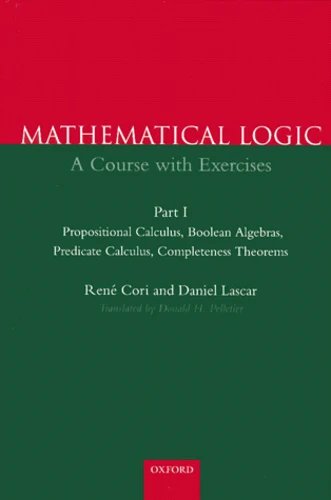Mathematical Logic, A Course With Exercises. Part 1, Propositional Calculus, Boolean Algebras, Predicate Calculus
Par : ,Formats :
- Paiement en ligne :
- Livraison à domicile ou en point Mondial Relay indisponible
- Retrait Click and Collect en magasin gratuit
- Réservation en ligne avec paiement en magasin :
- Indisponible pour réserver et payer en magasin
- Nombre de pages338
- PrésentationRelié
- Poids0.64 kg
- Dimensions16,3 cm × 24,1 cm × 2,4 cm
- ISBN0-19-850049-1
- EAN9780198500490
- Date de parution11/09/2000
- ÉditeurOxford University Press
Résumé
Logic forms the basis of mathematics, and is a fundamental part of any mathematics course. It is a major element in theoretical computer science and bas undergone a revival with the ever-growing importance of computer science.
This text is based on a course to undergraduates and gives a clear and accessible introduction to mathematical logic. The concept of model provides the underlying theme, giving the text a theoretical coherence whilst still covering a wide area of logic. The first chapter considers Propositional Calculus; then Boolean Algebras follow, Chapter 3 covers Predicate Calculus and this is followed by Completeness Theorems. Large numbers of examples appear throughout the text and each chapter concludes with a selection of exercises to reinforce the student's understanding. Answers to the exercises are given in an appendix.
Part II completes the course. Topics covered are: Recursion Theory; Formalization of Arithmetic, Gödel's Theorems; Set Theory, Model Theory.
Logic forms the basis of mathematics, and is a fundamental part of any mathematics course. It is a major element in theoretical computer science and bas undergone a revival with the ever-growing importance of computer science.
This text is based on a course to undergraduates and gives a clear and accessible introduction to mathematical logic. The concept of model provides the underlying theme, giving the text a theoretical coherence whilst still covering a wide area of logic. The first chapter considers Propositional Calculus; then Boolean Algebras follow, Chapter 3 covers Predicate Calculus and this is followed by Completeness Theorems. Large numbers of examples appear throughout the text and each chapter concludes with a selection of exercises to reinforce the student's understanding. Answers to the exercises are given in an appendix.
Part II completes the course. Topics covered are: Recursion Theory; Formalization of Arithmetic, Gödel's Theorems; Set Theory, Model Theory.




